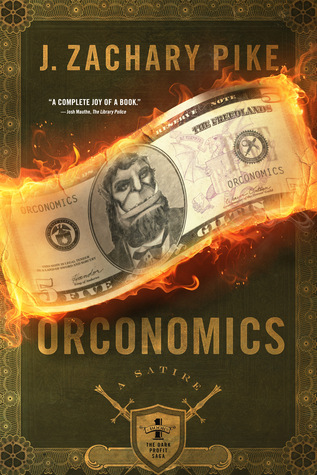Today I'm looking at a parody novel written by J. Zachary Pike titled Orconomics. This book takes the idea of the standard swords and sorcery RPG like Dungeons & Dragons and explores, at least partially, the economy that would develop around heroes going into dungeons, killing monsters, and bringing back fantastic shares of loot. As it's been argued before in some D&D circles, the sheer fact that high level characters can instantly inject hundreds of thousands of gold pieces more or less instantly into an economy, and yet the economy suffers no inflation. To that end Pike creates a plausible economy of plunder futures trading and other financial derivative products which would help soak up the excess capital. However, Pike covers additional topics which means this is not solely an economically-driven satire.
Orconomics follows Gorm Igerson, a former Dwarven Berserker famed throughout the world as Pyrebeard. Due to a dishonorable incident some twenty years ago, Gorm was cast out of his clan, stripped of his titles, and declared an outlaw by the Heroes' Guild. Ever since Gorm has been scraping by best he can, finding solace in the bottom of a bottle more often than not. But when Gorm decides to get a goblin non-combatant papers he gets caught by Guild Enforcers and is faced with a decision: either certain execution at the hands of the Guild, or only almost certain death on a damn fool mission to aid the prophet of an insane deity. As Gorm puts it, it's not much of a choice at all but almost certain death is marginally better than certain death. Now Gorm just has to get a team including a naive prophet, two mages that can't stand each other, a bard who is almost definitely not a thief, and a washed-up has-been Elven ranger to work as a team rather than fighting each other and there may be a chance he'll actually survive.
As I said, this is partly a parody of a monster-killing and loot-gathering based economy, with traders purchasing shares in dragon hoards and professional unions for heroes, goons, and thugs. However, Pike takes on more standard fantasy tropes in his parody as well, such as the assumption that the ''evil'' races like orcs, gnolls, goblins, and kobolds truly are always evil. True, it's a topic that's been done before but I think that Pike manages to do it rather well in his novel. And there are plenty of other enjoyable moments throughout this book to make it easy to read.
If I have any critiques of this book, I think it's that Pike tries to take on too much in this particular book. As you might have noticed, this is intended to be the first book in a series. (As of writing it doesn't look like he's published the second novel so we'll have to wait and see for now.) It definitely seems like Pike has grand ambitions for his series because he sets up several plot threads, including heroes getting addicted to healing potions, a clan of aggressive weapons salesmen, and a prophecy about the fate of the world all in the first book. It almost feels like he was trying to take on too much at once in one book to get all his plot threads up and running at once. While I appreciate Pike doing so because it gives me a sense of what sorts of plans he has for the series, I feel like he could have saved a couple to be introduced later and gone a little more in depth in this book with a couple plotlines.
Overall though, I thought this book was pretty enjoyable. Maybe not the must subtle of satire or writing, but still a pretty good introduction to a series that has promise.
- Kalpar


No comments:
Post a Comment